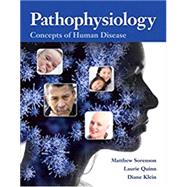NOTE: This loose-leaf, three-hole punched version of the textbook gives you the flexibility to take only what you need to class and add your own notes – all at an affordable price. For loose-leaf editions that include MyLab™ or Mastering™, several versions may exist for each title and registrations are not transferable. You may need a Course ID, provided by your instructor, to register for and use MyLab or Mastering products.
For courses in pathophysiology.
A human approach to pathophysiology, with an eye on promoting health
Pathophysiology: Concepts of Human Disease focuses on the human aspect of pathophysiology, acknowledging that diseases, disorders, and syndromes occur not in a vacuum, but in people — across the lifespan. Drawing on the health stories of real individuals, the authors provide the latest information in pathophysiology that is relevant to clinical practice, while empowering students with competencies that endure throughout a nursing career. Throughout the text, the approach to pathophysiology reflects a shift of focus in healthcare from understanding diseases in their later stages to understanding risk factors and the interventions that can maintain good health and slow progression of disease in humans.








